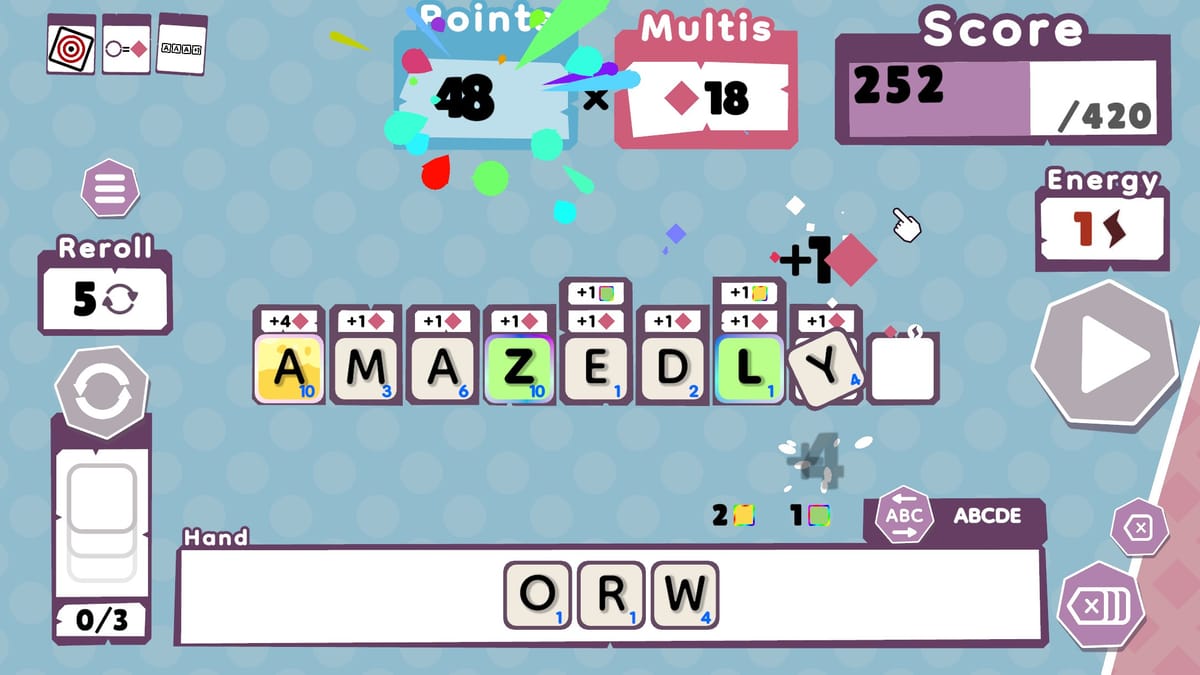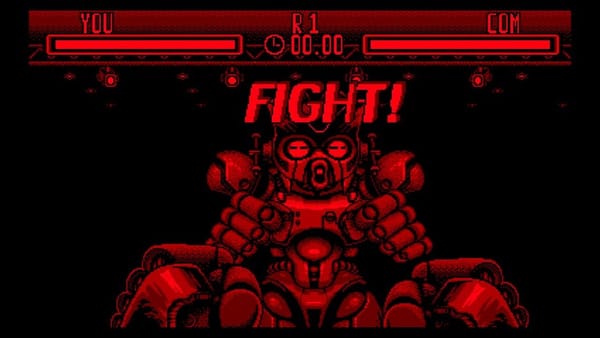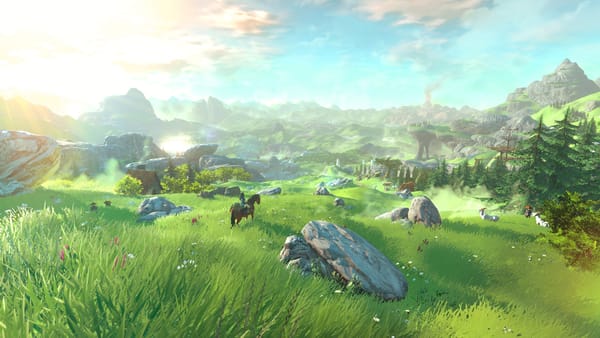#329: Screwball Scrabble
Word-based Roguelikes: suddenly a thing. Let's check 'em out!

I do not, generally speaking, approve of the Venn diagram approach to game-making. Obviously I can see the appeal of taking two provenly popular things and smushing them together, but it just feels a bit basic, y’know? It feels more like the sort of thing dreamed up by the biz guys than the design team; you can almost imagine the PowerPoint deck. Kids love monkeys! Kids love tennis! Kids will love Monkey Tennis 2026!
Despite all that, this week I have eagerly seized on the sudden appearance of a new genre hybrid that is, on the face of it, perfectly calibrated to my tastes. While my gaming diet varies in accordance with my consulting commitments, newsletter duties and the general release calendar, I have a few daily fixtures: either Slay The Spire or Balatro, and both Wordle and the NYT Spelling Bee. Run-based strategy-things and word games are my daily drivers, so when I noticed a sudden rush of word-based Roguelikes on Steam — three have launched in the last six weeks or so; there’s even a bundle of them up at the moment, if you’re so inclined — my curiosity got the better of me, and I dived in. I may be a man of principles, but I am also a sucker for being pandered to. Nobody’s perfect, eh.
There are some remarkable similarities between the three games I’m about to talk about. That all of them give you a randomised jumble of letters, task you with spelling words to reach an escalating score target, and offer up a selection of perks and upgrades in between rounds, is no surprise: this is all genre-standard stuff. Likewise the ability to manipulate the letter tiles in your bag/deck with score modifiers and suchlike, in the manner of Balatro’s tarot cards. But I am struck by how three different developers have sat down to consider the possibilities of a word-based Rogue-thing, and arrived at such similar conclusions. There are special tiles with near-identical, and sometimes literally identical, effects; Joker equivalents have remarkably similar properties. My cynical side wonders whether this reveals the limitations of this particular genre crossover! Perhaps the possibility space has a disappointingly low ceiling? There is only one way to find out.
Up first was Word Play, which I’ve been playing for a couple of weeks but have been a bit twitchy about writing about because of the person that made it. To be clear, I have nothing against Mark Brown, more commonly known by his YouTube moniker, Game Maker's Toolkit; he wrote a few bits for us in Edge some years ago, and seems a decent sort. But I’ve been struggling to articulate how I feel about this sort of YouTube-to-game-biz pivot since another #content creator, the excellent Videogamedunkey, started a publishing label and put out the very well-received Animal Well. I think I’ve finally put my finger on it: it’s like when a celebrity puts out a children’s book. Like, sure, it might be a very good book. But is it getting attention because of its inherent qualities, or because the person behind it is already well known? Perhaps I’m overthinking it, but it just feels a bit icky. Ho hum.
Anyway! Enough of that. Word Play is fine, but it is not for me; it is a little miserly, the Modifiers that play the role of Balatro’s Jokers just a little too restrained in their design. For me a fundamental part of the appeal of Rogue-things is escalation — being given opportunities to build something so powerful that it feels you’ve broken the game in half. Word Play has no interest in this sort of thing whatsoever. Perhaps, given his day job, the developer has chosen to chase some level of purity of design — something he wants the player to appreciate, rather than try and subvert? Perhaps I’m still in overthinking mode. Either way, I’m annoyed I don’t like this game very much, because it does one thing brilliantly: it uses both a US and UK dictionary. As any UK-based Wordle or Spelling Bee player — thwarted on the regular by the extent to which our transatlantic cousins have mangled our noble tongue — will tell you, that shit is worth its weight in gold.
Next up is Birdigo, which launched a couple of days ago and has a rather unconventional origin story. John August, a Hollywood screenwriter whose past work includes Big Fish, Corpse Bride and the underrated late-90s rave movie Go — it might be rubbish, to be fair; I've seen it a few times, but have never been sober for it — had an idea for a game and put out a call on his podcast, Scriptnotes, for someone to help make it. Corey Martin, maker of the well-regarded puzzler Bonfire Peaks, stepped up, and here we all are. It’s another game with Balatro on its mood-board, with a pleasingly wholesome theme of migratory birds. It looks nice, and sounds pleasant, and that’s about all I have to say about Birdigo, which didn’t grab me at all. It’s all a bit... languid. It also limits you to a starting hand of just seven tiles, and while that’s fair enough from a Scrabble-purism perspective, in the context of a Roguelike it’s just nowhere near interesting enough. I did not come here to play a load of four- and five-letter words, thanks. I come in pursuit of big numbers, and those you are unable to provide. Next!
Ah, Wordatro. Firstly, you have my respect for being so honest in your intentions; they are right there in the game’s name. Secondly, thank you for understanding how this sort of game, and Balatro in particular, actually works. It is far more generous in its power curve, doling out special tiles for free when you make longer words, and the bonuses on offer have far more dramatic effects. There are big synergies here, leading to big numbers. Your scoring ramps from the tens to the thousands at a pleasing lick, and judging by the leaderboards for its Spire-style daily challenges, scores in the hundreds of millions are possible too. If any of these three games are staying on my hard drive, Wordatro will be the one.
That said, I’m not sure any of them will. After a handful of hours in each game’s company, I have realised that, while I love spending time in the extremities of this Venn-diagram subgenre, life in the middle charms me rather less. I love Roguelikes for their pace, for how quickly you can make decisions and watch the consequences of them unfold — yet in a word-based game I spend far too long staring at the jumble of tiles in front of me, working out which word to play. In Slay The Spire, you always know which of the cards in your hand are the best; in Balatro, you are always looking for a particular hand, be that a Pair or a Flush Five or whatever. But in these three games you’re never quite sure whether the word you’re about to play is the best one you possibly could put down. Do you play the word you’ve found and cross your fingers, or spend another couple of minutes trying to find a longer one? While that’s a novel sort of tension for a run-based game, it’s not one I particularly gel with.
Still! What a fun experiment, and what a novel, weirdly convenient experience it has been to sort of speed-run through an entire subgenre in the space of a few days. It’s like I’ve been in a coma for 18 months and am racing to catch up. Back to Balatro I go, I suppose. (And if anyone fancies making Monkey Tennis 2026 with me, do get in touch. I have ideas.)
MORE!
- Poor Microsoft, laying off 9,000 workers. Things must be really tough over there, right? Bad vibes all round, surely. Don’t be silly! The firm released its annual results this week — covering a period that ended two days before those layoffs were announced — and revealed record revenue and profits. Ah, but maybe the Xbox business specifically is struggling? Nope! Gaming revenues in the last three months of the financial year were up 9%, with Game Pass alone bringing in almost $5bn. Fuck me sideways, what a miserable bunch of shits.
- The Steam/Itch NSFW farrago rumbles on. First, a quick clarification: it seems that some of the games that had apparently been ‘deindexed’ on Itch had never actually been ‘indexed’ in the first place, including Consume Me, the IGF-winning game I used for the header image in last week’s edition. Apols! This week various trade bodies finally swung into action and put out statements, and while most are mealy-mouthed and quite disappointing, Hit Points would like to give a hearty shoutout to Felix Falk, managing director of German trade association Game, for giving the situation the hearty boot in the balls it so clearly deserves. “Creative forms of expression or certain themes in games, such as diversity, must not be targeted by individual interests or campaigns from particularly vocal groups [...] The terms and conditions of global payment service providers must not conflict with European values such as freedom of expression or artistic freedom.” Woof. Overnight, Itch co-founder Leaf Corcoran said the platform was reindexing free NSFW #content, and will be “reintroducing paid content slowly” while discussions with payment providers continue. If that’s somehow still not enough for you, there’s a very good look at the factors at play in this mess over at GI.biz, courtesy of esteemed Hit Points chum Jeremy Peel.
- Atari has agreed to acquire ailing Swedish publisher Thunderful for $5.2m. That’s about as good an exit as Thunderful could have hoped for following a 99% drop (!) in its share price over the last few years.
- Sony is suing Tencent, alleging that the latter’s game Light Of Motiram is a “slavish clone” of Horizon. The suit claims that Tencent pitched a mobile Horizon game to Sony last year; that after Sony declined, Tencent carried on making it under a different name; and that, when Sony tried to resolve the issue after the game’s announcement, Tencent tried to licence the Horizon IP again. Good chutzpah that, fair play.
- Relax, nerds: Silksong will be playable at Gamescom. Any chance you could shut up about it for a bit? No? Worth a go I suppose.
- The British Esports Federation is a) apparently a thing that exists, and b) partnering with the UK’s ministry of defence on an esports tournament designed to “boost the country’s warfighting readiness” by helping military personnel “improve their digital and cyber skills” with a “focus on AI and drone operation”. Grim.
- Nintendo is raising the price of the Switch in the US on Sunday, citing the ol' "market conditions" as a euphemism for all the tariff nonsense. Some accessories, Amiibo and — gasp — the Alarmo clock are also getting hiked.
- Games-media titan IGN has launched a new industry insights platform called Gaming Trends. It’s kicked off by a video presentation you can watch by handing over an email address, but I cannot in good conscience recommend you do so. I lasted a few minutes, during which I was given a quick preview of a bunch of stultifyingly obvious observations — mobile is big! Switch 2 matters! UGC exists! — while being subjected to approximately 300 instances of the word “integrations”. I tapped out when the presenter took a quick detour into brazen promotion of some of IGN’s media properties. Not for me!
- Death to this James Pond reboot. Death.
There you go! My hearty thanks to Yesterday Nathan, who wrote most of today’s top story in front of the cricket in the afternoon, freeing Friday Nathan up for a light-speed tidy-up before the kids return later today. It’s been a blissfully quiet week and I’ve got so much stuff done, but the days have been far too long and I’ve definitely missed them a lot. Doesn’t mean I’m particularly jazzed about them coming back, mind you, but still. [4pm edit: they're back. Why is everything so noisy?] Anyway! Have a lovely weekend, and I’ll catch you all next week.





